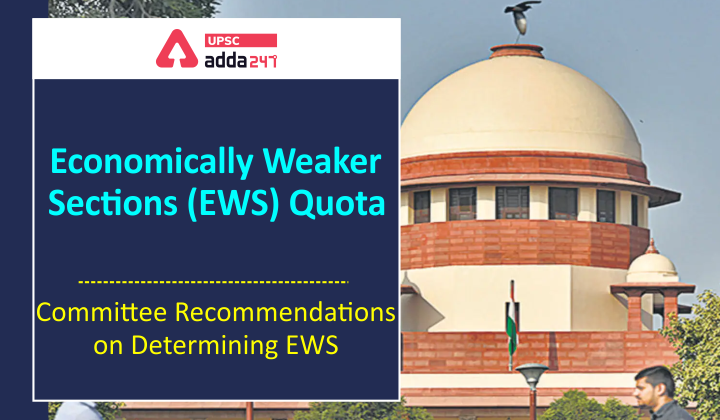Table of Contents
EWS Quota- Relevance for UPSC Exam
- GS Paper 2: Governance, Administration and Challenges- Government policies and interventions for development in various sectors and issues arising out of their design and implementation.
Economically Weaker Sections (EWS Quota)- Context
- Recently, the Central Government has told the Supreme Court that it has decided to accept the recommendation of a three-member panel on Economically Weaker Sections (EWS) Quota.
103rd Constitutional Amendment Act: Revisiting Income Criterion for EWS Quota
EWS Quota Committee- Key Points
- About: The Centre had constituted the three-member committee in November last year according to an assurance given to the top court to revisit the criteria for determining EWS.
- Members: The committee had three members comprising-
- Ajay Bhushan Pandey, former finance secretary,
- VK Malhotra, member secretary, ICSSR, and
- Sanjeev Sanyal, Principal Economic Adviser to Centre,
- Key Recommendation: The thee member Panel recommendations say that family income is a “feasible criterion” for defining EWS and in the current situation.
EWS Quota Criteria- Key Recommendations of the Panel
- Income Criteria: EWS Quota Panel recommended retaining the current gross annual family income limit for Economically Weaker Sections (EWS) of Rs 8 lakh or less. The panel said that-
- Only those families whose annual income is up to Rs 8 lakh would be eligible to get the benefit of an EWS reservation.
- The current limit of annual family income of Rs 8 lakhs does not seem to be over-inclusive as the available data on actual outcomes does not indicate over-inclusion.
- It should be noted that income includes salary and agriculture as well
- The income criterion for EWS was “more stringent” than the one for the OBC creamy layer.
- Agricultural Land: The panel recommended that EWS, may exclude, irrespective of income, a person whose family has five acres of agricultural land and above.
- Removal of residential Criteria: The panel recommended that the residential asset criteria may altogether be removed for defining Economically Weaker Sections (EWS).
- Continuation of existing system: EWS Quota panel suggested continuation of the existing system this year as well that is being used since 2019.
- The panel said that sudden adoption of new criteria on the committee report would delay and have cascading effects on the admissions.
- Use of Technology: The panel recommended that data exchange and information technology should be used more actively to verify income and assets for EWS Quota.
- Feedback Mechanism: It is also recommended that a three-year feedback loop cycle may be used to monitor the actual outcomes of these criteria and then be used to adjust them in the future.
103rd Constitutional Amendment Act: Revisiting Income Criterion for EWS Quota




 TSPSC Group 1 Question Paper 2024, Downl...
TSPSC Group 1 Question Paper 2024, Downl...
 TSPSC Group 1 Answer key 2024 Out, Downl...
TSPSC Group 1 Answer key 2024 Out, Downl...
 UPSC Prelims 2024 Question Paper, Downlo...
UPSC Prelims 2024 Question Paper, Downlo...





